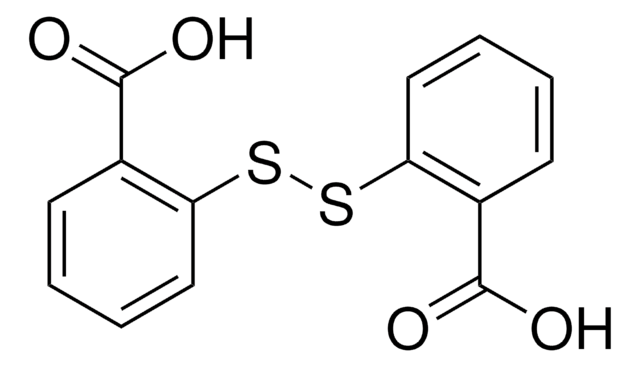723126
Bis(dodecylsulfanylthiocarbonyl) disulfide
≥95%
About This Item
Recommended Products
Quality Level
assay
≥95%
form
solid
mp
30-35 °C
storage temp.
−20°C
SMILES string
CCCCCCCCCCCCSC(=S)SSC(=S)SCCCCCCCCCCCC
InChI
1S/C26H50S6/c1-3-5-7-9-11-13-15-17-19-21-23-29-25(27)31-32-26(28)30-24-22-20-18-16-14-12-10-8-6-4-2/h3-24H2,1-2H3
InChI key
UUNRYKCXJSDLRD-UHFFFAOYSA-N
Related Categories
General description
Application
Storage Class
11 - Combustible Solids
wgk_germany
WGK 3
flash_point_f
Not applicable
flash_point_c
Not applicable
Choose from one of the most recent versions:
Already Own This Product?
Find documentation for the products that you have recently purchased in the Document Library.
Customers Also Viewed
Articles
RAFT polymerization uses commercial agents to control polymer properties without cytotoxic heavy metals like ATRP.
RAFT polymerization offers living characteristics to radical polymerization, contributing versatility to reversible deactivation radical polymerization methods.
Micro review of reversible addition/fragmentation chain transfer (RAFT) polymerization.
Protocols
RAFT polymerization offers precise control, enabling tailored synthesis of complex polymer structures.
We presents an article featuring procedures that describe polymerization of methyl methacrylate and vinyl acetate homopolymers and a block copolymer as performed by researchers at CSIRO.
We present an article about RAFT, or Reversible Addition/Fragmentation Chain Transfer, which is a form of living radical polymerization.
Polymerization via ATRP procedures demonstrated by Prof. Dave Haddleton's research group at the University of Warwick.
Our team of scientists has experience in all areas of research including Life Science, Material Science, Chemical Synthesis, Chromatography, Analytical and many others.
Contact Technical Service





![4-Cyano-4-[(dodecylsulfanylthiocarbonyl)sulfanyl]pentanoic acid 97% (HPLC)](/deepweb/assets/sigmaaldrich/product/structures/204/925/30ae6ca0-5b0b-4963-a061-7e5e3d1a85af/640/30ae6ca0-5b0b-4963-a061-7e5e3d1a85af.png)





